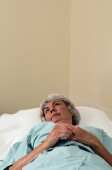
WEDNESDAY, June 6 (HealthDay News) — A new study finds that many doctors would recommend unnecessary colorectal cancer screening for elderly and sick patients, even though such screening would likely cause more harm than good.
The study was published online June 1 in the Journal of General Internal Medicine.
The study included 1,266 doctors (family practice, general internal medicine and obstetrics-gynecology physicians) who were given different scenarios involving patients ages 50, 65 or 80 with three different levels of health: no illness; moderately severe illness (heart disease); or severe illness (advanced lung cancer).
For each scenario, the doctors were asked which colorectal screening test they would recommend, if any. Overall, the older the patient and the more serious the underlying illness, the less likely the doctors were to recommend screening, the investigators found.
The healthier the patient, the more likely doctors were to recommend invasive screening such as colonoscopy instead of noninvasive tests such as fecal occult blood testing, the study authors pointed out in a journal news release.
But the study did find that 25 percent of primary care doctors recommended colorectal cancer screening for an 80-year-old patient with advanced lung cancer who would not benefit from the screening.
In addition, the researchers found that obstetrician-gynecologists were more likely than other doctors to recommend colorectal cancer screening for 80-year-old patients with advanced lung cancer, and that doctors with access to electronic medical records were less likely to recommend screening for elderly patients with severe illness.
“Most physicians appear to shift their recommendations in an appropriate manner in response to varying patient age and underlying illness. Yet there is a significant proportion of [doctors] who recommend screening among patients with limited life expectancy, for whom screening tests have no benefit and are potentially harmful,” wrote David Haggstrom from the Richard L. Roudebush VA Medical Center in Indianapolis, and colleagues.
“Further work is needed to better understand how physicians can develop more confidence in stopping screening when there is no clinical benefit, as well as quantifying the impact of over-screening with risky procedures on patient outcomes,” they added.
More information
The U.S. National Cancer Institute has more about colorectal cancer screening.

